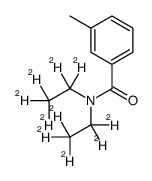1215576-01-4
| Name | 3-methyl-N,N-bis(1,1,2,2,2-pentadeuterioethyl)benzamide |
|---|---|
| Synonyms |
DEET-d10
N,N-(Diethyl-d10)-3-methylbenzamide (N,N-(Diethyl-d10)-m-toluamide 3-Methyl-N,N-(diethyl-d10)benzamide Flypel-d10 m-Delphene-d10 M-Det-d10 m-DETA-d10 N,N-(Diethyl-d10)-m-toluamide Metadelphene-d10 Dieltamid-d10 |
| Description | Diethyltoluamide-d10 is the deuterium labeled Diethyltoluamide[1]. Diethyltoluamide is the most common active ingredient in insect repellents. It is intended to provide protection against mosquitoes, ticks, fleas, chiggers, leeches, and many other biting insects[2]. |
|---|---|
| Related Catalog | |
| In Vitro | Stable heavy isotopes of hydrogen, carbon, and other elements have been incorporated into drug molecules, largely as tracers for quantitation during the drug development process. Deuteration has gained attention because of its potential to affect the pharmacokinetic and metabolic profiles of drugs[1]. |
| References |
[2]. Lu W, et al. DEET as a feeding deterrent. PLoS One. 2017 Dec 14;12(12):e0189243. |
| Molecular Formula | C12H7D10NO |
|---|---|
| Molecular Weight | 201.33100 |
| Exact Mass | 201.19400 |
| PSA | 20.31000 |
| LogP | 2.47700 |
| Symbol |

GHS07 |
|---|---|
| Signal Word | Warning |
| Hazard Statements | H302-H315-H319-H412 |
| Precautionary Statements | P273-P305 + P351 + P338 |
| RIDADR | NONH for all modes of transport |
